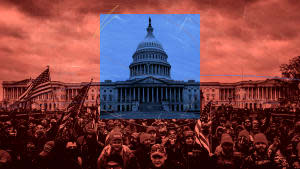Americans believe 2 completely different Jan. 6 narratives. Neither one is right.

How big a deal was the storming of the Capitol on Jan. 6, and how much should we talk about it? It depends on who you ask.
Two in three Democrats say the Capitol riot had a "'major impact' on their worldview," per a Morning Consult poll from late June, and headlines abound from left-of-center sources urging us not to forget this historic assault on the very foundation of American democracy by right-wing domestic terrorists who should be prosecuted to the fullest extent of the law.
Meanwhile, two in three Republicans, per that same poll, say we've focused on the day too much already. One GOP representative likened many of those who entered the Capitol to normal tourists. Another, while acknowledging an "unruly and dangerous mob of about 400 broke the law, trespassed, committed various other crimes, and endangered the health, safety, wellbeing, and lives of many innocent people," implied it's "hyperbolic" to label the day "an insurrection or even a rebellion."
Both extremes are wrong. I don't know exactly what the right course is, but I do know that it's somewhere in between those two poles, and that the degree of attention we've given the events of that day so far — as unsatisfactory and uncertain as it feels — may be just about the best we could realistically manage.
If that sounds like faint praise, let me detail what would have been worse. The most concrete risk was a legislative overreaction in the style of the post-9/11 security state, which would curtail Americans' constitutional rights and civil liberties on a broad scale while doing little to forestall similar future crises.
I wrote about this possibility in early February, when Canada chose to designate the far-right Proud Boys as terrorists alongside al Qaeda and the Islamic State. At that point, the Biden administration as well as other prominent Democrats were reportedly considering a legislative response to the riot that civil libertarians derided as a "Patriot Act 2.0." That response hasn't materialized after six months of Democratic rule, so the risk is likely past, at least for the time being. But a Patriot Act 2.0 is exactly the sort of thing all this "never forget" language about Jan. 6 is liable to produce. If you keep harping on a problem, people start to expect a legislative "solution."
On the other hand, it was a problem. That a problem may not have a good legislative fix does not make it cease to be a problem. That some accounts of the problem are hyperbolic — I think the milder "sedition" is a better descriptor than "insurrection," "coup," or "treason" — does not mean the problem is not grave. And though I think it's fair (and needful) to note that the vast majority of those who entered the Capitol were pretty harmless (individually, anyway), and that this was a far cry from an organized revolution, it's equally right to observe that some of the rioters were armed, allegedly including two guns brought onto Capitol grounds. Downplaying such a brazen assault on the rule of law has plenty of risks of its own.
Either way, if our conversations around Jan. 6 are held in bad faith, full of partisan sniping, one more eulogy for democracy that ends with a fundraising pitch for the next election — well, no thanks. Talking about this badly is an easy path to exacerbating our very social, political, religious, and epistemic difficulties that made Jan. 6 possible in the first place. Underplaying it invites more of the same; overplaying it, especially in elite and official quarters, would be taken as further proof that "they" are indeed "after you," as a tweet from former President Donald Trump to his supporters once said, and that they won't be bound by regard for truth in their attacks.
Here's one thing I am certain of while this debate — and the debate about the debate — continues: Whatever happens with The Discourse, the state has not moved on from this weak battery on its machinery. We may not see legislative shifts, but it seems safe to assume the FBI and other law enforcement agencies have extensive, open-ended, very possibly unconstitutional new programs purring into action to surveil, infiltrate, and manipulate the lives and organizations of people who stormed the Capitol (and people who know them, and people who know people who know them, and people who know people who know people who know them).
And while that proceeds in secret, out in public, the House of Representatives is forging ahead with its select committee investigation of Jan. 6, however much Republicans on the committee may try to undermine its work (several of the likely committee members tried to forestall the certification of President Biden's win). The rioters' trials are moving forward as well, with the first felony sentence handed down Monday.
Between verdicts and sentences yet to come and the eventual committee report, we'll be talking about Jan. 6 for some time. I don't know if we'll talk to much or too little, but my guess is we'll talk probably about as much as we have been talking, with about as much rightful ambivalence over how to handle this violent, silly, unsettling, comical, serious, absurd, altogether weird event.
You may also like
Why Tom Brady's 'gentle' roast of Trump at Biden's White House was actually 'deeply vicious'
McConnell implores unvaccinated Americans to get shots 'as rapidly as possible'
